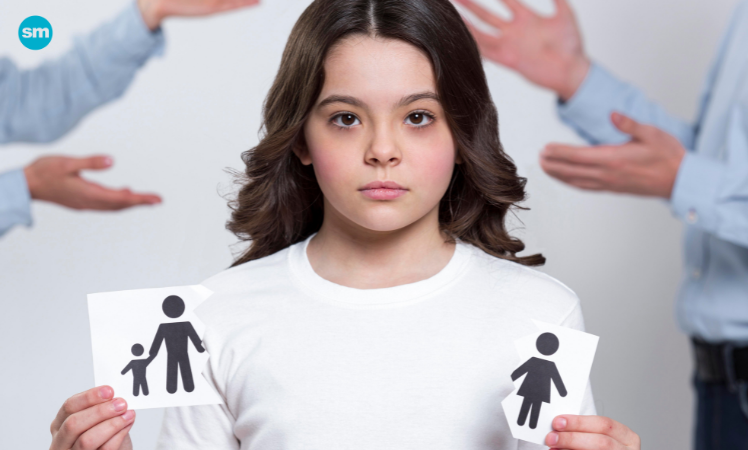What is the Difference Between Co-Parenting and Parallel Parenting?

Last Updated on January 23, 2024 by Lori Pace
When you’re deciding how to parent your child with your ex, either co-parenting or parallel parenting, it can be a difficult decision. It’s a decision that will have a long-term effect on you and your children.

So, you’ll have to decide between a co-parenting plan and a parallel parenting plan. But you’re not sure which one is right for you and your child. Here we’ve explained the differences between both parenting plans to help you choose.
Difference between Co-parenting and Parallel Parenting
“Co-parenting” is a term used for parents working together to raise their child or children. This is while the parents longer have a romantic relationship.
Both parents will play an active role in their child’s upbringing and any extra activities. They can communicate with each other in public and in private.
Both parents to be able to remain civil with each other. Both parents need to be able to put aside their differences for the sake of their child or children.
Usually, couples have worked out a co-parenting strategy during the divorce process.
There are some differences between parallel parenting and co-parenting. Parallel parenting happens when parents can’t communicate, even for the child’s sake.
A parallel parenting plan allows both parents to spend time with their children. They will be able to parent their children on their own. This helps reduce the amount of conflicts.
There’s only the smallest amount of contact between the parents. In some cases, the parents might need to go to court to establish a parenting plan. This is because the relationship between the parents is so volatile.
Tips for Making Co-Parenting Work
For co-parenting to work, there are a few steps you as the parent will need to take. These steps will help create a loving environment for the children involved.
Have open communication
This is an important rule when it comes to co-parenting. Poor communication in marriages can lead to poor communication between divorced parents.
Parents will need to be able to communicate with each other in different ways. For examples, in phone calls, emails and in text messages.
Keep a record of everything.
In some cases, a co-parenting plan might lead to more legal action. For this reason, single parents will need to keep a record of anything to do with their co-parents.
The record should include a list of anyone who might be a witness to your interactions. It should also have the date and time.
Make sure you stick to a regular schedule
Making sure you and your children stick to a regular schedule is key to co-parenting. Having a regular schedule will help the children thrive.
For example, you might have the children for every other weekend and Thursday night. You should still make sure that you focus on the child’s schedule.
But sometimes life happens, and you can’t avoid any conflicts. When this happens, you should sort this out in advance. Sorting these out in advance will help the children feel less stressed in these situations.
Don’t exaggerate
A surprise can catch anyone off guard, and this can be true for separated parents. When your co-parent does something to annoy you, it’s critical to stay calm.
Don’t lose your cool if your ex doesn’t invite you to a special event or is only a few minutes late for a child exchange. It’s critical to air your frustration in private.
Don’t argue in public.
Disagreements are a part of life. Co-parents that have different ways of parenting will often lead to disagreements. Having an
When these disagreements happen, it’s best not to fight in front of the children. You also shouldn’t put your children in the middle of your fights. You also shouldn’t say negative things about your co-parent to your children.
Share the good times with the co-parent.
Sharing good memories can be a significant moment in any co-parenting relationship. It can help relieve your ex’s nerves and worries.
Sending your co-parent a picture or a video of your children having a good time will go a long way to ease their nerves. In some cases, this will lead to your co-parent returning the favor.
Benefits of Co-Parenting
Children will know that their parents will love them with a healthy co-parenting plan. Parents will focus on their children’s needs even during tough times.
It can help a child feel secure and know that their parents love them. Healthy co-parenting will help them adapt to a sudden change from their parents getting a divorce. Being able to change easily can lead to them having improved or high self-esteem.
It can cultivate an environment where there are consistent rewards and rules. A consistent environment will help your children know what you expect from them and what to expect from their parents.
Co-parenting can help children have a better understanding of problem-solving skills. They will be able to see their parents work together to solve problems. Watching this example can lead to children improving their problem-solving skills.
When you have a healthy co-parenting plan with your ex can set a healthy example for your child or children. Successful co-parenting can show your children how to keep strong and healthy relationships.
Children of successful co-parents are healthier both mentally and emotionally. This is when they are compared to the children of divorced parents who fight in front of them. They are more likely to develop anxiety, ADHD, and depression.
How to make Parallel Parenting
A parallel parenting plan is more precise and clear-cut compared to co-parenting. This clarity can help parents avoid any unnecessary communication. A parallel parenting plan is usually done through family courts to make it more official.
Decide how you’ll spend time with your children in Parallel Parenting
When you and your ex decide how you’ll spend with your children, it’s essential to be transparent during this process. This transparency should include the days you’ll spend with your children. It should consist of where your children will spend holidays, birthdays, and vacations.
You should also be specific about the pick-up and drop-off times for both parents. For example, you should specify that the dad can have the children from Friday after school to Sunday at 6 pm.
It’s vital to make sure that there are no misunderstandings. These misunderstandings could lead to more conflict between the parents.
Pick a neutral spot for pick-ups and drop-offs.
In parallel parenting, the main aim is to ensure there is no conflict between the parents. Some people recommend that you choose a neutral pick-up and drop-off location. For example, it could be a parking spot or park between both homes.
In some cases, the relationship between two parents can be extremely volatile. In these cases, you might want to ask a friend or family member to help you handle the drop-off or pick-ups. Doing this can help limit the chances of an argument happening in front of the children.
Decide how you’ll handle disagreements in Parallel Parenting

A healthy parallel plan can keep arguments and disagreements to a minimum. But even with the perfect plan, there will be disagreements. In these cases, it’s important how you handle it.
If you can see any problems in the future, you appoint a parenting coordinator or a mediator. A meeting with the mediator can prevent you and your ex from constantly arguing back and forth.
Decide how you’ll handle cancellations.
Life happens, and there will be times when you or your ex will need to cancel. It’s best to work out a plan to handle these cancellations in advance.
With these plans, you’ll want to make it clear that your ex will be able to make up the missed time with your children. It should also work out when they can make up the missed time, such as an extra day in the week or an extra holiday.
Benefits of Parallel Parenting
There isn’t an emphasis on the parents having a good relationship. For this reason, some people believe that parallel parenting isn’t good for the child. Some think that it can add extra stress for the children.
A successful parallel parenting plan work in the best interests of the whole family. Parallel parenting can protect the children from seeing any fights between the parents.
Proper Parallel Parenting can lead to your children feeling safe and more secure. They will be able to cope with the changes that come with their parent’s separation and divorce.
Another benefit is that there is a chance of it leading to a co-parenting plan between the parents. But parents shouldn’t feel guilty if it doesn’t lead to co-parenting.
In some cases, separation and divorce can cause emotions to run high for parents. The conflict between parents might lead to parents having heated arguments in front of their children.
It will give parents a chance to heal from the emotional trauma and resentment. Once both parents have healed, they will be able to communicate with each other.
How to know which parenting style is right for you | Co-parenting or Parallel Parenting?
Deciding between co-parenting and parallel parenting can be a difficult decision. Like any other parent, you want the best for your children.
Both parallel parenting and co-parenting are similar. But there are some critical differences between the two parenting styles. Both parenting styles have different ways to protect the children involved from conflicts.
When you decide which parenting style is best for you to create a healthy parenting relationship, it’s best to think about what is best for you and your child. It’s also best to consult a child custody lawyer to help you work out the best parenting plan for you and your ex.






